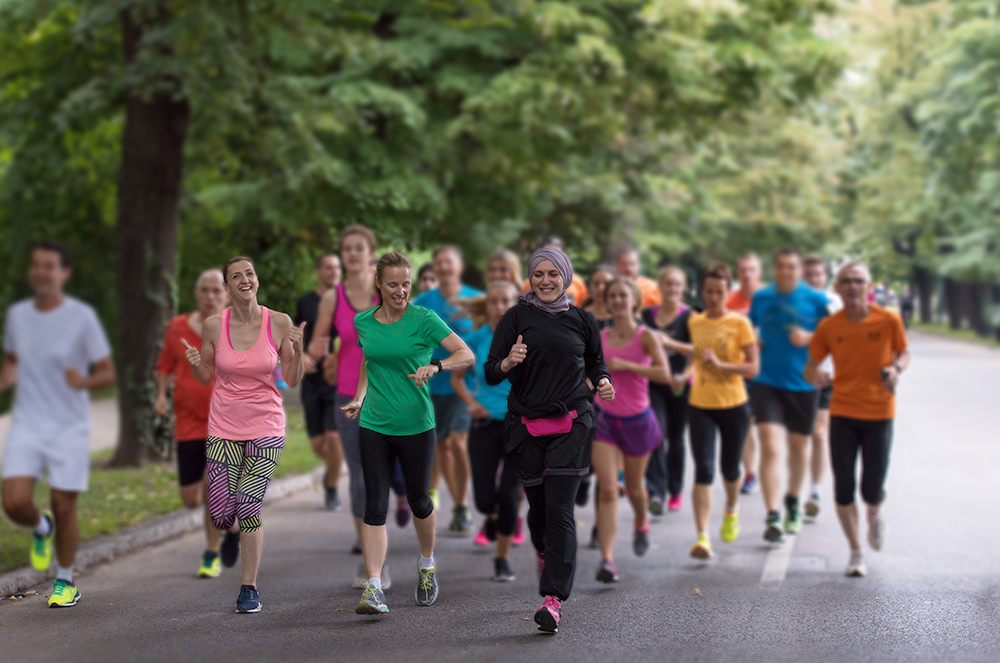What Are the Differences Between Someone Who Run and Someone Who Doesn't for an Entire Year?
“After finishing work, I immediately head out for exercise when I get home, neglecting to spend time with my family."
"During early weekends, I vanish without a trace. I disregard the children and rush out, returning only close to noon. After a hearty meal, I drift off to sleep."
"It's just running, right? How did it turn into such an addictive obsession?"
"Running to the extent of neglecting family and responsibilities" is often criticized by family or friends. However, despite the complaints, the number of runners has been increasing in recent years. What's happening?
The truth is, there are numerous benefits to running! I began running at 27 and stuck to a routine of running three times a week for a whole year. I noticed a substantial difference between those who run and those who don't. Moreover, I believe that after reading this entire article, you will realize that the earlier complaints aren't really drawbacks at all. Now, let's explore the advantages of running together with MIER, a company that offers a range of high-quality running gear.

Running is like medicine; it has therapeutic effects
When we're in the office or at home, we're often juggling the expectations of multiple parties—bosses, clients, family, or children. Our lives revolve around meeting their needs.
Yet, stepping out for a run offers a brief escape from societal demands, giving us a chance to confront ourselves. While running, we can delve into our inner world, relishing the freedom of solitude. It allows for quiet introspection about recent actions and aids in rebuilding our fragmented selves, torn between work and family.
This seemingly simplified process of running away is only temporary. Returning from our run to society, work, or family often leaves us mentally fortified and recharged. Running has a 'therapeutic effect', akin to how sleep rejuvenates life on a physiological level.
In the Renaissance era, French writer Montaigne noted in his 'Essays of Montaigne': 'They step back not to retreat but to stand more resolute, to leap farther, ultimately returning to the crowd with greater vigor.'
For those of us part of the 'working masses', running replenishes the energy needed to face life anew, aiding in the recovery from societal strains and wounds.
Runners Experience Heightened Focus
The book "Exercise Changes the Brain" highlights how engaging our muscles prompts the body to produce specific proteins like "Insulin-like Growth Factor 1" (IGF-1) and "Vascular Endothelial Growth Factor" (VEGF). These proteins travel through the bloodstream to the brain, fostering synaptic growth among brain neurons. That's why, after completing a run, not only do we often feel emotionally serene, but our thinking sharpens, becomes more agile, and our concentration improves.
Personally, I often view running as a method to clear my mind.
For example, during previous translations of "Daniel's Running Formula," I'd encounter moments where a sentence couldn't be translated, failing to bridge the meaning between sentences. Sometimes, a single sentence could stump me for an hour. My go-to fix was to step out for a run, pondering while I ran, letting the sentence settle in my mind. Almost invariably, I'd find the right answer within the rhythm of my steps.
When tackling particularly tough problems, I relish heading out for a run while contemplating, especially after a long-distance LSD run; somehow, the solutions seem to effortlessly unfold.
Running triggers, the release of dopamine and norepinephrine in the brain—two substances that regulate the attention system. The mechanism behind running's enhancement of focus lies in its capacity to elevate the levels of these neurotransmitters. It's an instant effect—observable after every run. With a consistent running routine, by stimulating neurogenesis in specific brain regions, we can elevate the baseline levels of dopamine and norepinephrine secretion. Consequently, secretion levels surpass the average, resulting in heightened focus compared to individuals who don't regularly engage in exercise.

Runners Experience Lower Rates of Depression
During long-distance running, the human pituitary gland releases a substance known as endorphins. Its impact on the brain is similar to that of morphine and opioids, producing feelings of pleasure while naturally alleviating pain, and acting as a soothing agent. As a result, some medical professionals suggest that individuals dealing with depression engage in long-distance running to combat feelings of despair.
Typically, engaging in exercise for over two hours is more likely to trigger a substantial release of endorphins. Consequently, marathon runners, in comparison to participants in other sports, frequently encounter the euphoric effects associated with running. When we're ensnared in challenging situations, it's unusual not to feel disheartened. Therefore, opting for a run during such times not only uplifts our mood but also boosts our endurance while grappling with difficulties, significantly amplifying the likelihood of resolving them.
However, recent research by German experts employing advanced equipment revealed that running on a treadmill fails to trigger the release of endorphins. This could be attributed to the absence of sensory stimuli since, on a treadmill, one doesn't experience scenic views or the sensation of a breeze brushing against the skin as steps gradually fade away.

Runners Exhibit Stronger Immunity and Confidence
Additionally, endorphins can also bolster the body's immunity and confidence.
In a state of joy and confidence, even the minor aspects of substantial challenges become noticeable. This implies that contemplating while running makes it simpler to identify the core of the problems, leading to greater patience afterward in calmly addressing each issue.
Since intricate problems often comprise a series of smaller issues, akin to editing photos in Photoshop, the initial view might present an array of problems. Yet, much like using the "zoom in for inspection" function to manage flaws in an image, addressing each flaw individually feels far more manageable.
Running Sustains the Harmony of Our Mind and Body
In Bernd Heinrich's book "Racing the Antelope: What Animals Can Teach Us about Running and Life," humans are portrayed as enduring predators.
The dominant genes in our bodies have evolved over hundreds of thousands of years, during times when we were consistently active, whether in pursuit of food or spending days chasing antelopes across expansive grasslands.
Our ancestors possessed the ability to exhaust even the swiftest animals, such as antelopes, by persistently pursuing them until they were too fatigued to escape, successfully capturing them.
Antelopes excel in short bursts of speed; their metabolism restricts prolonged running. However, we, as humans, can sustain long runs indefinitely. Furthermore, our distribution of fast-twitch and slow-twitch muscle fibers is well-balanced. As a result, even after covering several kilometers, we retain the metabolic capacity for rapid bursts of speed and effective hunting.
Certainly, while survival no longer hinges on hunting in today's world, our genetic makeup retains this instinct. Our brains are wired to command these actions, and tampering with this instinct disrupts the finely tuned biological balance that has developed over millennia. Hence, the principle is simple: harnessing this enduring metabolic function is pivotal to maintaining our bodies and minds in peak condition.
The human brain of ancient times evolved to tackle the myriad challenges encountered in primitive life. To address these challenges, early humans engaged in physical activities like walking, jogging, embarking on extensive journeys to gather food, or employing quick bursts of speed in hunting. These endeavors triggered the brain to release various substances, sustaining both physical and mental fortitude.
In today's modern society, the necessity for lengthy food-gathering expeditions or hunting has faded away. However, extended periods of sitting not only upset bodily equilibrium but also disturbed the balance in the brain, leading to various ailments associated with civilization. Running, among the most primal forms of exercise, stands as the cornerstone for harmonizing our brains and bodies.

You know, considering the multitude of benefits running offers, why would anyone still decline to run?
Regarding claims that runners neglect their families, based on my knowledge, many runners actively involve their families in their running routines. It not only fosters stronger bonds but also contributes to everyone's well-being. As for assertions that runners don't spend time with their kids, that's an oversimplification. Personally, I know numerous running enthusiasts who adeptly manage their time, striking a balance between quality time with their children and partners. And let's refrain from condemning running as an addiction. Friends, is there anything more heartwarming than being addicted to exercise?
The transformations that come from staying committed to running are all positive changes in life. Anyone who has tasted the joy of running wouldn't want to stop. Perhaps the most marvelous change running brings is encountering a better version of ourselves.



